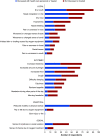Adverse Effects, Smoking, Alcohol Consumption, and Quality of Life during Long-Term Oxygen Therapy: A Nationwide Study
- PMID: 35657698
- PMCID: PMC9528738
- DOI: 10.1513/AnnalsATS.202110-1174OC
Adverse Effects, Smoking, Alcohol Consumption, and Quality of Life during Long-Term Oxygen Therapy: A Nationwide Study
Abstract
Rationale: Long-term oxygen therapy (LTOT) is prescribed for at least 15 hours per day and often used by patients for several years, but knowledge is limited regarding adverse effects, risk exposures, and health-related quality of life (HrQoL) among those treated. Objectives: To determine the prevalence of adverse effects, smoking, and alcohol consumption and their relations to HrQoL among patients treated with LTOT. Methods: This was a cross-sectional survey of a randomized sample of adults with ongoing LTOT in the Swedish National Registry for Respiratory Failure (Swedevox). Patient characteristics and the prevalence of 26 prespecified adverse effects, smoking, and alcohol consumption, were compared between respondents with better and worse HrQoL on the chronic obstructive pulmonary disease assessment test. Results: A total of 151 respondents were included (mean age, 74.7 yr [standard deviation, 8.6 yr]; 58.9% women; median LTOT duration, 2.2 yr [interquartile range, 1.0-3.8 yr]). Characteristics upon starting LTOT were similar between respondents and nonrespondents. Active smoking was very rare (n = 4, 2.6%). For alcohol use, 67.2% of participants reported no consumption during an average week, whereas risk use was reported by 25.8% of men and 16.9% of women. The most prevalent adverse effects were reduced mobility or physical activity (70.9%), dry mouth (69.5%), congestion or nasal drip (61.6%), increased tiredness (57.0%), and dry nose (53.0%). Patients with higher numbers of total and systemic adverse effects experienced worse HrQoL, whereas no associations were found for smoking status or alcohol consumption. The majority (54.8%) of adverse effects were untreated and unreported to health professionals. Conclusions: Adverse effects are common among patients with LTOT and are associated with worse HrQoL. As the majority of adverse effects had not been discussed or treated, structured assessment and management of risk exposures and adverse effects is warranted.
Keywords: HrQoL; LTOT; adverse effects; alcohol consumption; smoking.
Figures



References
-
- Hardinge M, Annandale J, Bourne S, Cooper B, Evans A, Freeman D, et al. British Thoracic Society Home Oxygen Guideline Development Group British Thoracic Society Standards of Care Committee. British Thoracic Society guidelines for home oxygen use in adults. Thorax . 2015;70:i1–i43. - PubMed
-
- Nocturnal Oxygen Therapy Trial Group Continuous or nocturnal oxygen therapy in hypoxemic chronic obstructive lung disease: a clinical trial. Ann Intern Med . 1980;93:391–398. - PubMed
-
- Long term domiciliary oxygen therapy in chronic hypoxic cor pulmonale complicating chronic bronchitis and emphysema. Report of the Medical Research Council Working Party. Lancet . 1981;1:681–686. - PubMed
Publication types
MeSH terms
LinkOut - more resources
Full Text Sources
Medical
Research Materials

